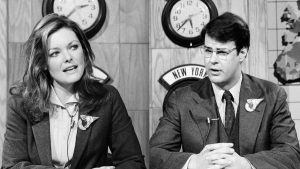ABA Law Practice Today — Point-Counterpoint: The Likelihood of Revising RPC 5.5

SNL’s Point-Counterpoint
Perhaps, I’ve never (co) authored an article with a smaller potential audience than the great give-and-take on the bandied-about subject of Model Rule 5.5 under the Rules of Professional Conduct. In the November 2022 edition of the American Bar Association’s online webzine, Law Practice Today (LPT), together with Charity Anastasio of the American Immigration Lawyers Association (AILA), we debate the viability of a revision.
In Point-Counterpoint: The Likelihood of Revising RPC 5.5, we ask and answer the question – Is the Association of Professional Lawyers’ Proposal for a Revised Model Rule 5.5 on its way, or DOA?
It was at a recent meeting of the ABA’s Law Practice Division Ethics and Professionalism Committee, where nearly an hour was spent discussing and debating the April 2022 proposal from the Association of Professional Responsibility Lawyers (APRL) for revisions to 5.5 under the Model Rules of Professional Conduct (RPC), that I proposed the idea of co-authoring a point-counterpoint. While my mind was thinking about how easily Charity and I would morph into the Jane Curtin-Dan Ackroyd roles from the Weekend Update segments on Saturday Night Live, it was not until I googled it to remember that the SNL segment was a parody of Point-Counterpoint from the early days of 60 Minutes. Regardless, referencing an SNL sketch and entertaining segment of 60 Minutes might get a few people that are not law ethics aficionados to read the informative and entertaining 3,000-word debate.
Model Rule 5.5 deals with the related subjects of Unauthorized Practice of Law; and Multijurisdictional Practice of Law:
(a) A lawyer shall not practice law in a jurisdiction in violation of the regulation of the legal profession in that jurisdiction, or assist another in doing so.
(b) A lawyer who is not admitted to practice in this jurisdiction shall not:
(1) except as authorized by these Rules or other law, establish an office or other systematic and continuous presence in this jurisdiction for the practice of law; or
(2) hold out to the public or otherwise represent that the lawyer is admitted to practice law in this jurisdiction.
(c) A lawyer admitted in another United States jurisdiction, and not disbarred or suspended from practice in any jurisdiction, may provide legal services on a temporary basis in this jurisdiction that:
(1) are undertaken in association with a lawyer who is admitted to practice in this jurisdiction and who actively participates in the matter;
(2) are in or reasonably related to a pending or potential proceeding before a tribunal in this or another jurisdiction, if the lawyer, or a person the lawyer is assisting, is authorized by law or order to appear in such proceeding or reasonably expects to be so authorized;
(3) are in or reasonably related to a pending or potential arbitration, mediation, or other alternative resolution proceeding in this or another jurisdiction, if the services arise out of or are reasonably related to the lawyer’s practice in a jurisdiction in which the lawyer is admitted to practice and are not services for which the forum requires pro hac vice admission; or
(4) are not within paragraphs (c) (2) or (c)(3) and arise out of or are reasonably related to the lawyer’s practice in a jurisdiction in which the lawyer is admitted to practice.
(d) A lawyer admitted in another United States jurisdiction or in a foreign jurisdiction, and not disbarred or suspended from practice in any jurisdiction or the equivalent thereof, or a person otherwise lawfully practicing as an in-house counsel under the laws of a foreign jurisdiction, may provide legal services through an office or other systematic and continuous presence in this jurisdiction that:
(1) are provided to the lawyer’s employer or its organizational affiliates, are not services for which the forum requires pro hac vice admission; and when performed by a foreign lawyer and requires advice on the law of this or another U.S. jurisdiction or of the United States, such advice shall be based upon the advice of a lawyer who is duly licensed and authorized by the jurisdiction to provide such advice; or
(2) are services that the lawyer is authorized by federal or other law or rule to provide in this jurisdiction.
(e) For purposes of paragraph (d):
(1) the foreign lawyer must be a member in good standing of a recognized legal profession in a foreign jurisdiction, the members of which are admitted to practice as lawyers or counselors at law or the equivalent, and subject to effective regulation and discipline by a duly constituted professional body or a public authority; or,
(2) the person otherwise lawfully practicing as an in-house counsel under the laws of a foreign jurisdiction must be authorized to practice under this Rule by, in the exercise of its discretion, [the highest court of this jurisdiction].
Charity makes many good arguments for the need to revise 5.5 in today’s legal marketplace. In arguing why those revisions most likely will not come to fruition anytime soon (I reference “in my lifetime”), it is not so much that I’m against the benefits related to making the changes, but that the profession—governed at a state bar level—will simply not allow it. Perhaps you will read it and have a different take. Let me know.
If 5.5 does not float your boat, the November issue of LPT is dedicated to the theme of Ethics in law practice, including some great contributions from other members of our ethics committee. Dave Ries, the committee chair, writes on Cybersecurity for Attorneys: Addressing the People Part of Security; and Dan Siegel discusses To BCC or Not To BCC – That Is The Question. Plus, a great roundtable discussion of What It Takes to Be an Ethical Lawyer Today, from my good friend Nick Gaffney of Zumado PR.
 Marketing Attorney Blog
Marketing Attorney Blog

